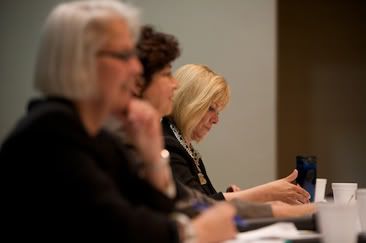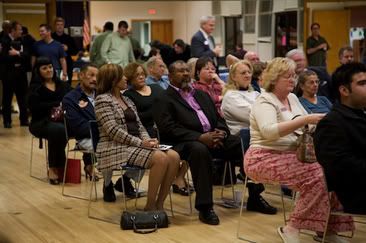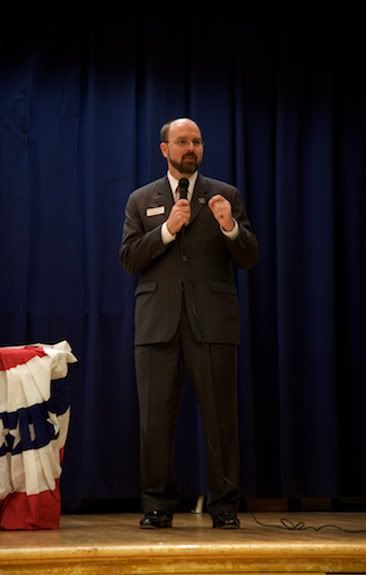
They tossed light jabs and threw heavy haymakers at each other, some missing and some hitting. The two Democrats and two Republicans competing for votes in the June 3 primary converged at Long Beach’s Veterans Park Monday night to discuss pollution, voter redistricting and California budget concerns.
They didn’t mind getting a little personal in the process.
In Long Beach, all eyes have been on the Democratic race, where City Councilwoman Tonia Reyes Uranga and Vice-Mayor Bonnie Lowenthal have battled for weeks for supremacy amongst voters in a Democrat-heavy voting district. But Republicans Gabriella Holt and Michael A. Jackson, who are less known in Long Beach because of Holt’s residency in Palos Verdes and Jackson’s lack of fundraising, proved that there is still a fight to be won.
Intros
Introductions began with Republican candidate Michael A. Jackson, a former Navy vet and engineer by trade who has faced an uphill battle from his own party, and expressed his versatility by describing his ability to appeal across party lines because of his responsibility to his constituents. “They cannot wait to see change,” he said.
Jackson’s opponent Gabriella Holt opened next. A registered nurse with school board experience, and recent service with the Probation Commission, Holt expressed her front-lines, hands on experience. “It is a very good time to run,” she said.
Long Beach City Councilwoman Tonia Reyes Uranga kicked off the Democcratic introductions by proclaiming that she is the candidate to represent her party in November. She expressed her desire to stay away from negative campaigning and explained that the difference between herself and Vice-Mayor Lowenthal is life experience. She was adamant about Long Beach air quality and healthcare issues, and called education “another area where Sacramento has failed us.”
Long Beach Vice-Mayor Bonnie Lowenthal stressed similar concerns, including air quality and the environment, education, healthcare and the state budget. She pointed to her experience in positons that she was asked to run for, and expressed a desire to “extend service that I’ve given to Long Beach to the state of California.”
Port of Long Beach No-Net Increase
All candidates expressed support for a bill that would curb Port of Long Beach expansion once the port had reached a certain level of production, in order to reduce pollution, but many other factors were included.
Holt outlined a need to keep any upcoming bill short and simple, without complicated add-on issues that confuse voters. Reyes Uranga called for the EPA to put pressure on the port to force incoming ships to switch to cleaner fuels to reduce air pollution. “Not just the ports,” she said, referring to trucking and railroads, “But all industries around the port need it.”
Lowenthal agreed, but maintained that efforts must be made beyond those mentioned. She called for the use of alternative fuels in all methods of transportation, from shipping to commercial and personal vehicles. Jackson agreed, saying, “We have the technology and abilities to make that a go.” He pointed to his related expertise as a mechanical engineer. “I’m the one to make this happen,” he said.
Jackson then warned that, “You’ve got to listen to what [the candidates are] doing and not what they’re saying.” He then explained that Democrats had killed Assemblymember Warren Furutani’s bill to keep railroad shipping yards away from schools, unintentionally leading into the next debate question about support or disdain for Furutani’s idea.
All candidates called Furutani’s efforts valiant, and vowed to support the idea. Reyes Uranga expressed her excitement to win the election just to vote in favor, while Lowenthal called the pollution from railyard shipping yards that accumulate near schools, “Absolutely unacceptable.” Jackson supported the idea and warned that those who voted down the idea had received donations from railroads, while Furutani had not. Holt brought up the idea of smartboards installed in locomotives to shut down engines during idling, which causes a mass amount of the accumulated pollution.
What would you do to clean the Los Angeles River, and do you support recent proposals to re-direct its flow into the Port of Long Beach?
“We’re losing one of our greatest assets,” said Lowenthal, agreeing with all candidates that the re-direction proposal should be examined closely to change the flow of the Los Angeles River away from city beaches. Jackson proposed working with other West Coast ports to examine possible solutions, while Holt proposed fining polluting cities with a plan in which “repercussions flow upstream,” and Reyes Uranga likened the proposal to the Breakwater study in that the idea will take years to study and properly implement. She also called for stricter polluting regulations.
“If they don’t clean up the river,” she said, “We have to pursue litigation.”
As a California Assemblymember, what would you do to curb excess government spending?
Jackson reaffirmed his claim to represent the people, and not blind party loyalties. “We should use money for the community,” he said, “Not cronies and payoffs.”
Holt, his opponent, outlined two major ways to simply cut spending, by addressing the problem of medical fraud (which she claims could save $3 billion per year) and moving low-level offenders into the County system.
Reyes Uranga called for a complete restructuring of Sacramento’s spending methods, and Lowenthal proposed a comprehensive review of all tax systems in the state, including updating tax laws and loopholes, oil company windfall profits and possibly altering tax breaks for the 10-11% income bracket that were implemented by Ronald Reagan.
Re-Drawing Traditionally Democratic 54th District To Balance Voting
The two Republican candidates feasted upon this question, frustrated by the traditionally Democrat-heavy district lines drawn, and called for immediate change. “Voters should pick legislators,” Holt said, “Legislators shouldn’t pick voters.” Jackson proposed a computer program that would construct unbiased voting lines, and claimed that “Democrats drew the district so that Long Beach Democrats will run against Palos Verdes peninsula Republicans,” because more than two-thirds of the 54th District voters live in Long Beach.
Democrats Reyes Uranga and Lowenthal also called for change. Reyes Uranga spoke about a disconnect between voters and legislators, and feared that the problem would cause the public to lose interest in the Democratic process. Lowenthal pointed out that many residents cannot vote in the same election as their neighbors next door or down the street.
To Democrats: You both voted for the 2001 Pension Spike, which turned out to bankrupt the city. Why should I vote for you?
Reyes Uranga maintained that she had just recently been voted into her Council seat before making a quick decision in the pension vote, without any previous experience with the bill. She also said that two classes of employees should not exist, and announced that the City Council would look into the issue in Tuesday’s meeting.
Lowenthal said that the pension spike had been explained to the Council as a very safe bet, and that there was no concern for pension spiking that would eventually hurt the city. Years later, it was realized that City Manager Henry Taboada and the City Auditor had given bad advice, and the City Manager was let go for this reason.
Reyes Uranga used her 30-second rebuttal time to explain that Taboada had not left for that reason, and was let go because of a lack of communication between himself and the Council as well as the public, and that his ideas did not fit with those of others.
Lowenthal used her time to respond. “We had spent years spending more money than we took in,” she said. “That’s why Henry left.”

To Republicans: What service do you have that makes you more qualified than your more-experienced Democratic competitors?
Jackson pointed to a life of public service that began with ten years in the Navy and continued as an aerospace project manager, where he was in charge of multi-million dollar projects that were completed on time and within the expected requirements. He also mentioned his membership with the National Association of Parliamentarians, and noted that his knowledge would allow him to work well with members of both parties.
Holt explained her ground-level experience in the fields of healthcare and education as a nurse and teacher. She has also overseen 20,000 youth and 70,000 adults as a member of the Probation Commission. Because of her Doctorate in Health and Administrative Law, she points to her ability to pass bills without resistance from peers and the courts.
***
Moderator Alan Tolkoff acknowledged that the Libertarian candidate was not included, but explained that this was due to the fact that he faced no opponent, and the debate was intended to help voters decide their June 3 primary vote.
The general election between one candidate from each party will be held in November 2008.
By Ryan ZumMallen, Managing Editor



